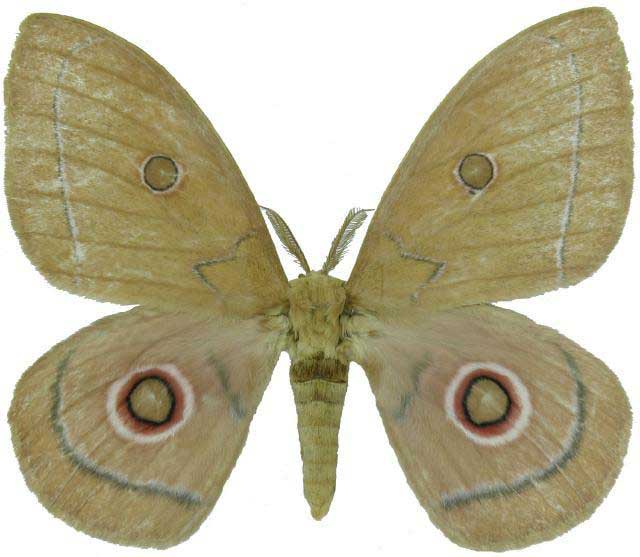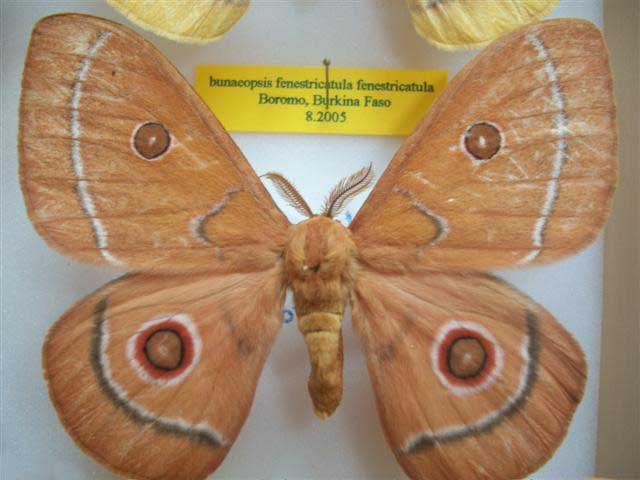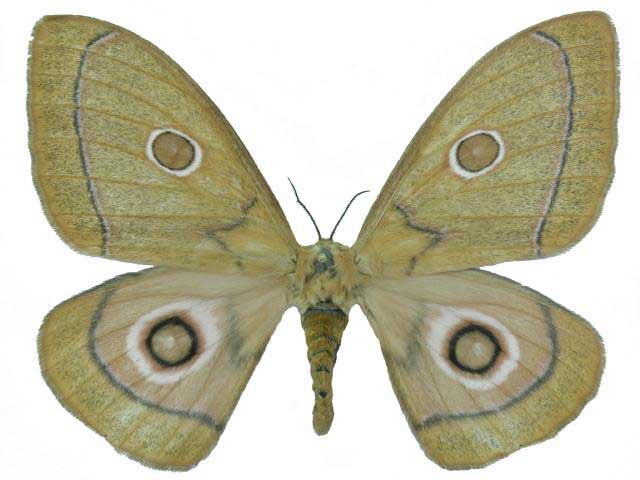Bunaeopsis fenestricula
|
|
Updated as per Bouyer's Catalogue of African Saturniidae, 1999, April 5, 2006
Updated as per personal communication with John Kamps (Boromo, Bale Province, Burkina Faso, August 2005); February 2010
|
Bunaeopsis fenestricula
bewe-nay-OPS-ihsmmfeh-neh-strik-EWE-luh
(Strand, 1911) Bunaea

Bunaeopsis fenestricula male, Burkina Faso, July 2006, courtesy
of Yves-Pascal Dion.
This site has been created by
Bill Oehlke at oehlkew@islandtelecom.com
Comments, suggestions and/or additional information are welcomed by Bill.
| TAXONOMY:
Superfamily: Bombycoidea, Latreille, 1802
Family: Saturniidae, Boisduval, [1837] 1834
Subfamily: Saturniinae, Boisduval, [1837] 1834
Tribe: Bunaeini, Packard, 1902
Genus: Bunaeopsis, Bouvier, 1927
|
MIDI MUSIC
Wind Beneath My Wings
copyright C. Odenkirk
MIDI CITY
ON.OFF
<bgsound src="wings.mid" LOOP=FOREVER>
|
DISTRIBUTION:
Bunaeopsis fenestricula flies in
Burkina Faso: Bale Province: Boromo (JK).
Thierry Bouyer lists
this moth as "incertae sedis" in his 1999 catalogue.
Incertae sedis means "of uncertain position (seat)". It is a phrase
used to define a taxonomic group where the broader
relationships are unknown or undefined.
Thus, Bunaeopsis fenestricula may be a distinct species,
but it might also be a synonym for other similar moths
going by a different name. More scientific study is needed to
determine the relationships.
I am not sure if the correct spelling is 'fenestricula'
or fenestriculata' or 'fenestricola'.

Bunaeopsis fenestricula male, Boromo, Bale Province, Burkina Faso,
August 2005, courtesy of John Kamps.
FLIGHT TIMES AND PREFERRED FOOD PLANTS:
There is possibly only one generation per year with moths on the
wing in July-August.
Larval hosts are unknown.

Bunaeopsis fenestricula female, Burkina Faso, July 2006, courtesy
of Yves-Pascal Dion.
ECLOSION, SCENTING AND MATING:
Bunaeopsis fenestricula
males are probably active at night and probably come in to
lights. Females have not been collected, but it is
expected they scent at night and have a very strong ovipositing
urge.
EGGS, LARVAE AND PUPAE:
The life history is unknown.
I believe all mature Buanaeopsis larvae
excavate subterranean chambers and pupate underground.
It is hoped that this alphabetical listing followed by the
common name of the foodplant will prove useful. The list is not
exhaustive. Experimenting with closely related foodplants is
worthwhile.
Use your browser "Back" button to return to the previous page.
Go to Index for African Saturniidae
Go to Main Index for all Worldwide Saturniidae
The pronunciation of scientific names is
troublesome for many. The "suggestion" at the top of the page is merely
a suggestion. It is based on commonly accepted English pronunciation
of Greek names and/or some fairly well accepted "rules" for latinized
scientific names.
The suggested pronunciations, on this page and on other pages, are
primarily put forward to assist those who hear with internal
ears as they read.
There are many collectors from different countries whose
intonations and accents would be different.
The genus name Bunaeopsis, indicates a
similarity ('opsis' = looks like) to the Bunaea genus. That name is from the Greek
and refers to a lobed hill-dweller.
I do not know the origin or meaning of the species name.


